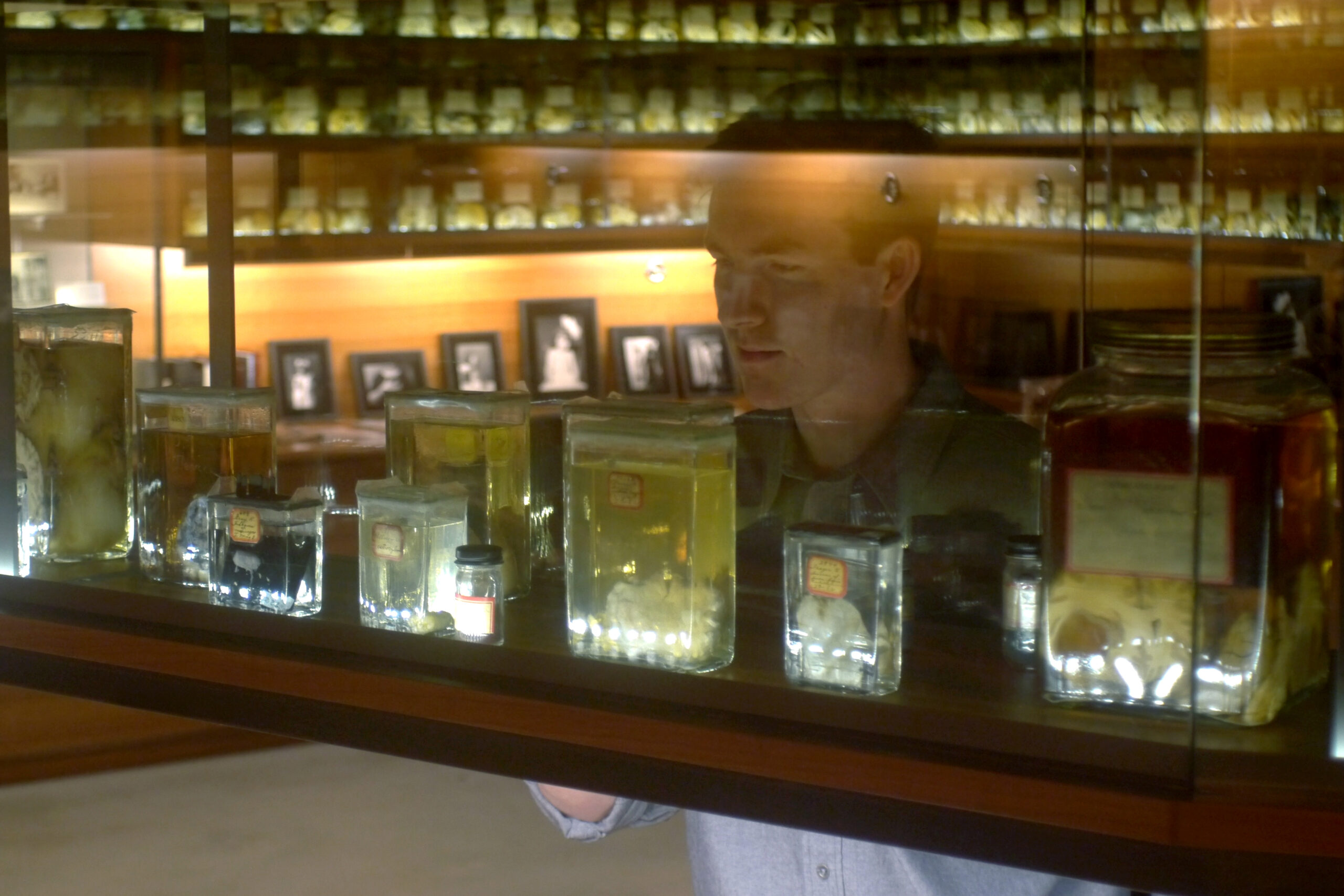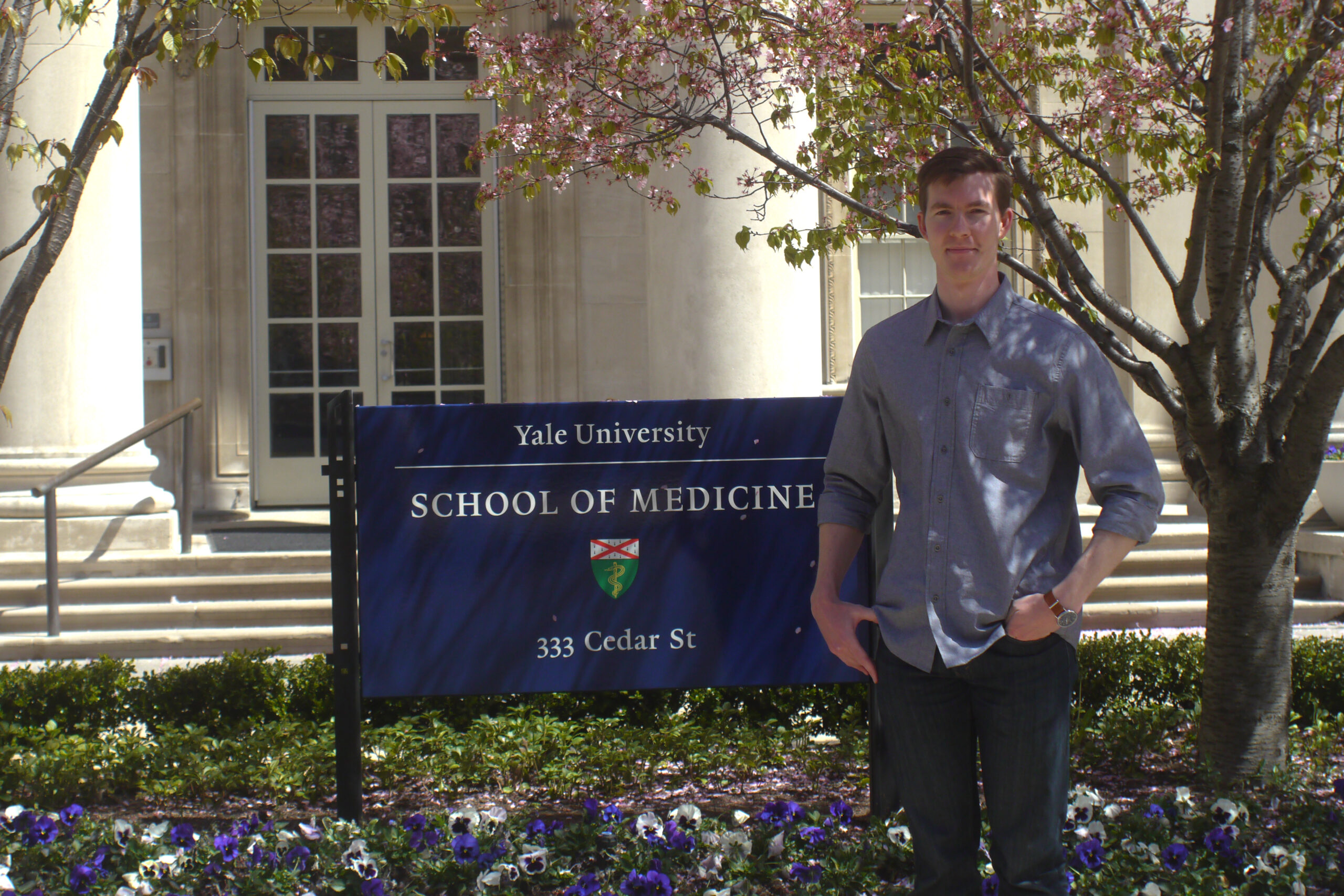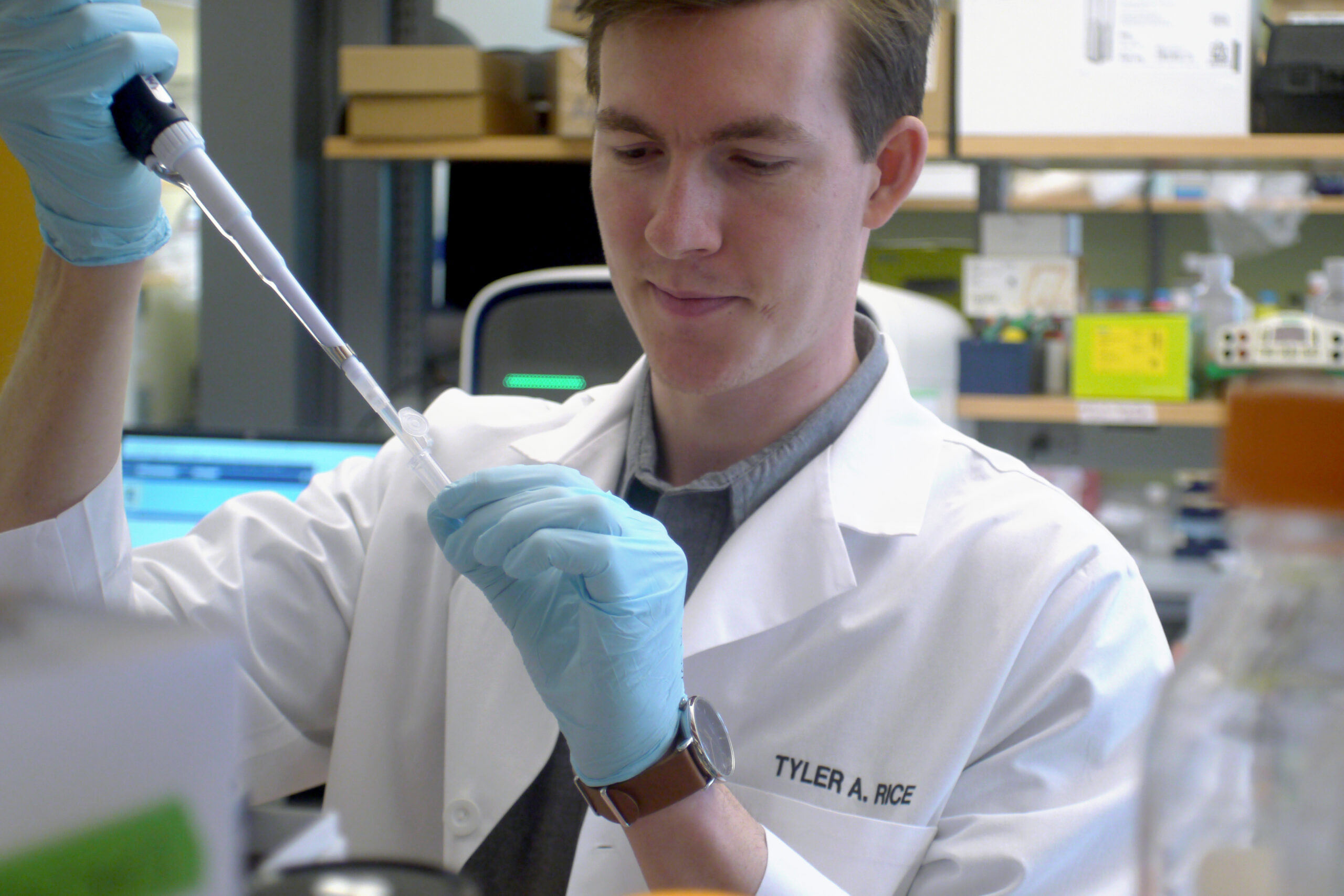Tyler Rice


When Tyler Rice stood on the Branscomb Auditorium stage at Florida Southern College giving his salutatorian address to the Class of 2009, it was clear that he had a bright academic future ahead of him. He went on to graduate from Auburn University in 2013 with a B.S. in molecular biology, completed a fellowship at the National Institute of Health (NIH), and now he’s a doctoral student at Yale University, one of the most prestigious Ivy League schools in the United States.
We caught up with Tyler to learn more about the amazing research opportunities he’s undertaking at Yale as well as the impact that his years at Lakeland Christian School had in preparing him for life.
On His Time at LCS
Engage Magazine: What are some of the activities you were involved with during your time at LCS?
Tyler Rice: I played on the tennis team for five years, participated in band, student council, A-team, and in the first few inaugural LCS football seasons, Mr. Livesay kept stats for every game with Ian Thomas, Mickelyn Graves and me as the spotter and stats crew.
EM: Which teachers had the greatest impact on you and why?
TR: Mr. Steve Livesay challenged me to reach for excellence in all my endeavors, not only to honor God but also to love my neighbor by doing work skillfully and diligently. As Dorothy Sayers wrote elegantly in a 1942 essay titled Why Work?, “It is the duty of the Church to see to it that the work serves God, and that the worker serves the work.” It was clear to me as a student in his classes that Mr. Livesay had indeed served his work faithfully, as his long and varied career exemplifies both excellence and service. He was also one of the first people who directed my attention to Auburn University, his alma mater.
EM: What were your career aspirations when you were a student at LCS?
TR: I recall that I wanted to be a biomedical engineer at the time, a career that typically applies engineering principles to solve problems in medicine and the life sciences.
EM: You’ve been featured in the LCS “Prepared for Life” campaign recently. Tell me how you feel that LCS prepared you, not only academically, but for life.
TR: My LCS family shaped so much of who I am today, especially my conviction that people, their hearts, are among the highest priorities I should attend to, as taught by Scripture. If I don’t love my community or my colleagues well, I could carry out groundbreaking work that would fall completely flat because I “missed the mark.” The God of the universe and the people He made in His image should always be valued more highly than inanimate objects or achievements.
EM: If you could pick one thing about your LCS experience that you are most thankful for, what would you say?
TR: Jeans days. No, just kidding! One LCS experience that is unique from other typical schools that I will always remember warmly is Work-a-Thon. A full day of service and connecting with Lakelanders was a great opportunity to be the “hands and feet” of Jesus. Although there were SO MANY bags of leaves, Work-a-Thon was always full of laughter as we got to participate in the kingdom of God in action.
On His Undergraduate Study and Fellowship Program
EM: You attended Auburn University. What was the focus of your academics there?
TR: My academic work at Auburn was basically acquiring lots of different “tools” to put in my scientific “toolbox.” I certainly didn’t master these experimental tools and techniques yet, but I was exposed to a wide variety of systems that biologists use to probe the intricacies of the natural world, from agricultural crops to nanomaterials to bizarre deep-sea invertebrates. Anyone and everyone can learn these core scientific tools and how to ask insightful questions about our world, at which point one is free to roam into whatever fields his interests may take him. At Auburn I learned how to learn, and then I began to narrow into a particular field from there.
EM: Did you know early on in your undergrad what you wanted to do, or did you change your mind as you progressed through school?
TR: I changed my mind substantially over the course of my college years. From the start I had a hunch that I wanted to be involved in science somehow, but not until senior year when I took an immunology course did I really find that inner spark of intense curiosity. The immune system is amazingly complex, but there are many central questions that remain unanswered (Why are allergies and autoimmune disease so prevalent? Why are only some vaccines protective? How far will immunotherapy take us in treating cancer?).
EM: How well do you feel that LCS prepared you for college?
TR: LCS academics were excellent in preparing me for college, especially in the arena of writing and communicating. No matter your major, all college students are expected to clearly convey their ideas about a variety of topics, and classes at LCS were very rigorous in expecting that I communicate clearly and effectively.
EM: You had a fellowship at the National Institute of Health in Bethesda, Maryland. What did you do there? What was the focus of your research?
TR: At the NIH I learned a lot about antiviral immune responses by studying a mouse model of human respiratory syncytial virus (RSV), which is a particularly deadly pathogen for infants. We learned that certain probiotic bacteria, similar to those in your yogurt, can help prime the innate immune system such that a viral infection is less inflammatory in the airways. In the course of this project, though, it’s important to acknowledge that I made lots and lots of mistakes in the lab. Conducting research takes persistence and dedication, and my excellent, kindhearted mentor, Dr. Helene Rosenberg, supported me and shaped me through those hard lessons into becoming a better, more resilient scientist.
On His Research at Yale University


Tyler visited and interviewed at several colleges around the United States before choosing to study Immunology at the Yale University School of Medicine.
EM: When you decided to pursue a Ph.D. program, what was the process and how did you decide on Yale?
TR: Applying to graduate school in the life sciences is similar to applying for college, but then some programs that consider you as a candidate will typically fly you to their campus for a recruitment weekend. I visited several schools around the country and ultimately chose to join Yale Immunobiology because of its tight-knit research community. Spanning roughly 20 lab groups, the people in this department are so genuine and kind— they regularly offer to help each other with experiments, ideas, techniques, as well as everyday stuff outside the lab. Also when I was in high school I did not know that most programs in the sciences will pay their grad students to go to school—it’s essentially a job.
EM: What do your days look like at Yale?
TR: At this point I’ve finished all my classwork, so an average day involves little to no studying. Rather, I push several research projects forward, and my time is split between culturing bacteria, setting up mouse experiments, analyzing cells, sequencing genomes and then discussing results (and inevitable failures) with my lab mates. Recently we’ve also begun some collaborations with clinical researchers that provide us access to various patient cohorts and their samples. Of course, I do less exciting stuff too, like reading the current research literature in my field, and making lots and lots of PowerPoint slides.


Tyler spends much of his time at Yale conducting research that will help people who suffer from diseases such as ulcerative colitis and Crohn’s disease.
EM: What is the focus of your research, and what do you hope to accomplish during your time there?
TR: My research focuses on mucosal immunology: the interface between the many immune cells in the intestinal tissue and the approximate 100,000,000,000,000 (one hundred trillion) bacteria living inside the human gut—the commensal microbiota. Some people develop inflammatory bowel diseases (IBD) like Crohn’s disease or ulcerative colitis that stem from excess immune activation in their gut, despite carrying the same types of commensal bacteria as healthy individuals. We’re trying to elucidate the molecular principles that dictate this host- microbe relationship such that doctors might be able to intervene in order to restore IBD patients to health. Development of preventive vaccines is also a goal as well, though we need a clearer understanding of the underlying biology to inform our vaccine design.
EM: Your research has been published. Tell us about that.
TR: I was an author on a few studies published by Dr. Rosenberg that reported our work on lactobacillus and the mouse pathogen Pneumonia Virus of Mice (the ortholog of human RSV). We found that immune cells called monocytes and macrophages contribute to protective anti-inflammatory responses by signaling through a few key receptors. More recently I’m compiling the data for a manuscript with my current advisor, Dr. Noah Palm, in which we’ve evaluated how the immune system “keeps tabs” on a particular commensal bacteria through the actions of an antibody, immunoglobulin A (IgA). This bacterial species lives peacefully inside many healthy people but can also drive IBD under certain unfavorable conditions.
EM: What do you want to do after you’re done with education?
TR: After completing my PhD I will likely take a postdoctoral fellowship position in another lab to further diversify my research training and become more independent in my investigations. Ultimately I’d like to lead my own laboratory team one day at a university or hospital or research institute. Chasing a particular research question seems very appealing as well as the opportunity to mentor young scientists in my lab. I’ve had a number of mentors who have contributed so much to my growth as a person and scientist, and I’d like to pay that forward with my own trainees.
Final Thoughts
EM: The mission of Lakeland Christian School is to educate students in the light of God’s Word to equip them for a lifetime of learning, leadership, service and worship. The goal is to prepare students not only during the few years they’re at LCS but for a lifetime. How has that mission played out—and continue to do so—in your life?
TR: My time at LCS taught me that not only should I strive to continue learning throughout my whole life, but also to reconsider daily how my identity in Christ provides a different perspective on work and relationships than that of other worldviews. He calls me to love Him firstly and glorify Him in the truths that I uncover, then love my neighbors, listen to them, cherish them and point them to the hope of the gospel in any way that I can. I’m regularly filled with gratitude and awe that this is what He’s called me to do, so all I can do in response is walk with Him in obedience and faith.
Tyler’s Research Citations:
Dyer, K.D., et al. (2015). Journal of Virology 90, JVI.02279-02215. Percopo, C.M., et al. (2015). Antiviral Research 121, 109-119. Rice, T.A., et al. (2016). Antiviral Research 132, 131-140.